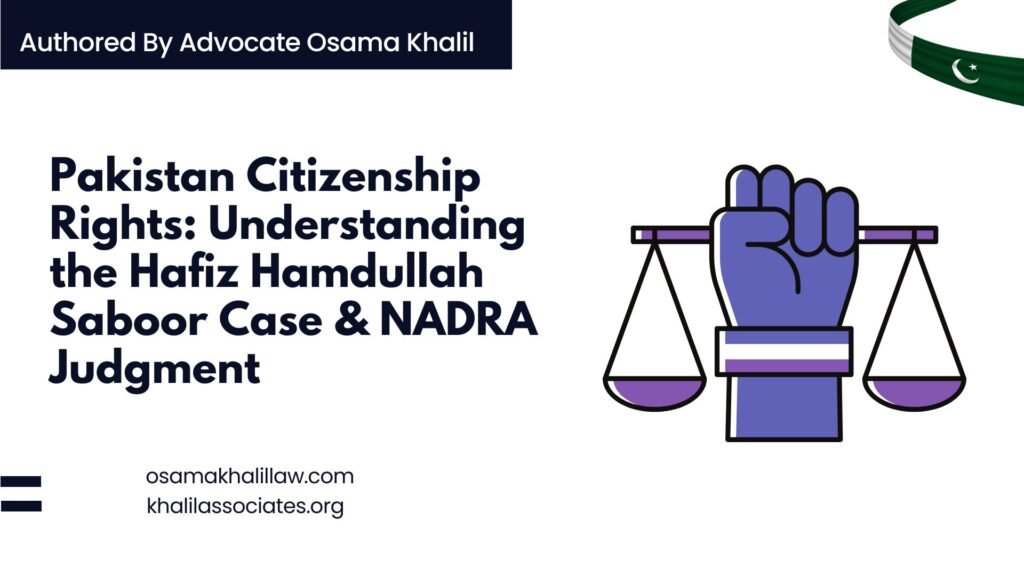
In a major decision for citizenship rights, the Islamabad High Court delivered a powerful judgment that protects people from being arbitrarily stripped of their nationality. The case, known as Hafiz Hamdullah Saboor vs. Government of Pakistan, sets a crucial legal precedent. This ruling fundamentally reinforces the principle that the government cannot make its own citizens stateless through reckless actions.
What Was the Case About?
The case involved several petitioners, including a prominent politician and senator, Hafiz Hamdullah Saboor. The National Database and Registration Authority (NADRA) had blocked or cancelled their Computerized National Identity Cards (CNICs). Authorities took this drastic action solely based on reports from intelligence agencies that simply stated these individuals were “not citizens of Pakistan.” The government presented no proof that these individuals held another nationality or had acquired their CNICs through fraud.
The Devastating Impact of Losing Citizenship Rights
The court vividly described the horrific consequences of having your CNIC blocked. Without this card, a person’s life in Pakistan effectively grinds to a halt. Losing your citizenship rights means you cannot access your bank accounts, get a job, run a business, or receive education and healthcare. This action essentially removes the constitutional right to life and dignity, rendering a person stateless and without any rights.
What Does the Law Say About Citizenship?
The judgment provides a clear lesson on Pakistani law regarding the right to nationality. The Pakistan Citizenship Act of 1951 is the supreme law on this matter. The court focused on Section 4 of this Act, which guarantees birthright citizenship. This law states that every person born in Pakistan after 1951 shall be a citizen by birth. This right is automatic and granted by operation of law, not as a privilege from the state.
The Limited Exceptions to Birthright Citizenship
The court clarified that the exceptions to this rule are very narrow. A person born in Pakistan might not get citizenship only if, at the time of their birth, their father possessed diplomatic immunity or was an enemy alien. In all other cases, being born in Pakistan makes you a citizen. The government bears the responsibility to prove otherwise if it wishes to challenge someone’s right to nationality.
What Is NADRA’s Role? Can It Decide Citizenship?
A central part of the ruling was defining the limits of NADRA’s power. The court found that NADRA’s main job is to register people and issue identity cards based on the information provided. It is not a court or a special tribunal. NADRA does not have the legal authority to investigate, judge, or decide on complex questions of citizenship. That power rests solely with the federal government following a strict process under the Pakistan Citizenship Act.
The Illegal Use of Intelligence Reports
The court strongly condemned the practice of using secret intelligence reports as the sole basis for cancelling CNICs. It declared that NADRA acted completely outside its jurisdiction by accepting these reports as final proof without any proper investigation or trial. This reckless action violated the citizens’ fundamental rights and the principles of justice and due process.
The Wrongful Ban on Media Appearances
In Hafiz Hamdullah’s case, after cancelling his CNIC, the Pakistan Electronic Media Regulatory Authority (PEMRA) also banned TV channels from inviting him to talk shows. The court declared this order illegal and a clear misuse of power. It violated the constitutional right to freedom of speech and information. The court struck down this ban, affirming that a person’s right to express their views cannot be taken away so easily.
The Court’s Final Decision and Directives
The court allowed all the petitions and ordered NADRA to immediately restore the CNICs of all the affected petitioners. It declared that the actions taken by NADRA were without any legal authority and jurisdiction. The court also made it clear that its decision does not prevent the federal government from starting proper legal proceedings against someone if it has credible evidence. However, any such action must strictly follow the process laid down in the Pakistan Citizenship Act.
Why This Judgment Matters for Every Pakistani
This judgment is a monumental shield for the citizenship rights of every Pakistani. It protects ordinary citizens from being rendered stateless by the arbitrary actions of any government institution. The ruling reinforces that citizenship is the most basic right because it is the “right to have rights.” The state must never adopt policies that inadvertently or deliberately create statelessness. This case ensures that every person’s right to nationality is secure and can only be challenged through a fair and transparent legal process, not through secret reports or overreach by registration authorities.
Legal Assistance
For professional legal guidance and support in immigration matters, you may contact:
Mr. Osama Khalil
Lawyer & Legal Consultant
📞 Phone: 0316-1829946
📧 Email: contact@osamakhalillaw.com | contact@khalilassociates.org
